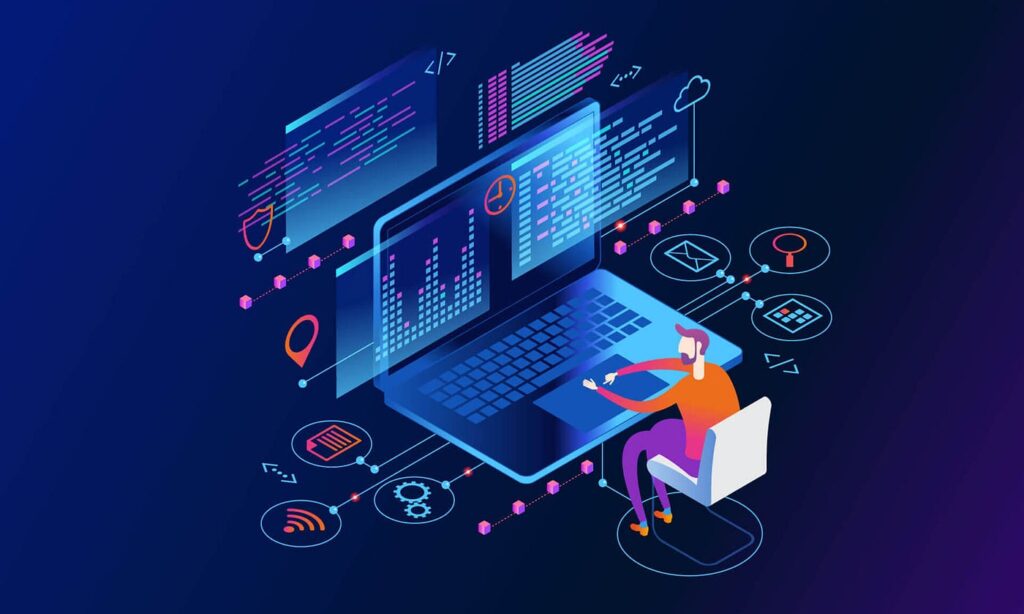Blockchain technology was initially an idea that was specialized before it became an established development tool that has transformed techniques for building software. Blockchain technology has gone beyond the jargon of industry and was introduced in 2025, and has become an essential building block in creating secure, open as well and distributed systems. Blockchain alters the way software is developed and is gaining recognition as the next technological leader. This blog examines the latest advancements and new possibilities. This article will discuss the fundamentals of technology while focusing on practical applications and developers, as well as the benefits for businesses.
What Is Blockchain Technology?
A digital ledger, also known as blockchain, records transactions using an unalterable secure system. Blocks within the chain include many transactions that are inaccessible after new blocks are included in the chain. The technology creates an approach that incorporates trust as an essential component. Traditional databases with central authority control don’t exist when using blockchain, as its decentralization gives complete control to no one person or entity across the entire network.
Key Features of Blockchain
The system functions without authority to control the information. The system is less susceptible to catastrophic failures due to the fact that there is no single critical point.
- The system is encrypted and transaction linking, which creates almost unattainable conditions to hackers who want to alter the information that is recorded.
- Every participant in the network must be transparent in their transactions, which increases confidence between users.
- The information stored in blocks remains unchangeable after recording, which ensures precision and reliability.
The Evolution of Blockchain
The idea of Blockchain was first discovered via Bitcoin in 2009 to create an electronic payment system that was free of central bank oversight. Teams of developers discovered that blockchains had capabilities beyond their original purpose as a digital currency. It now has applications in multiple industries that include finance, healthcare, along supply chain operations as well as entertainment.
The technology will be able to achieve higher effectiveness and improved user experience by 2025. Blockchain technology allows developers to use a variety of development tools and platforms that enable developers to build applications that make use of blockchain concepts. Blockchain-specific programming languages, along with frameworks given developers the ability to create innovative tools to create impossible solutions over the last decade.
Blockchain in Software Development
Blockchain is more than just a transaction-recording software since it has evolved into an essential technology that can transform the entire process of developing software applications. This list shows how blockchain technology is causing transformations within the sector:
The security of conventional software systems is still vulnerable to external attacks, including hacks, data breaches, and other security issues. Blockchain is a security framework that is built on encryption and decentralization strategies. Blockchain provides complete security for applications that handle sensitive data, such as personal data, as well as financial transactions.
Developers are now able to create programs that record any changes made by blockchain technology. Blockchain’s open systems allow users to be confident in the system as they are able to observe all changes that are taking place, which is essential for healthcare and financial applications.
Blockchain networks support Decentralized Applications (dApps,) which replace central servers with the advantages of decentralization, which offer more security and performance in the face of one point of failure. Digital programs can find applications across various systems that include gaming, as well as social networking platforms.
Smart Contracts define this technology as one of the most revolutionary developments. Smart contracts are operated automatically by code that contains agreed-upon terms in writing. The system implements pre-determined rules and executes programmatic actions in response to specific triggers. The system speeds up operations and reduces the need for middlemen.
How Blockchain Improves Software Development Processes
- Blockchain deployment is rapid due to the fact that developers don’t have to handle central control issues. This accelerates the process of development.
- The capabilities that are automated in smart contracts make sure that many procedures that require human interaction are automated. The system facilitates better workflows in operations and also reduces operational costs.
- Blockchain lets different parties collaborate on applications while ensuring complete security during collaboration. Blockchain can facilitate partnerships between companies that allow them to carry out jointly funded projects.
- Blockchain’s unalterable nature lets developers verify the authenticity of data since it is unaltered. Applications that rely on exact records require this feature to work properly.

Benefits for Software Developers
A New Era of Innovation
Blockchain technology brings numerous benefits to software developers, which can transform their app development and deployment. The following list highlights the main benefits developers can gain from blockchain.
Improved Security and Data Integrity
Blockchain operates on a decentralized system that can prevent interruptions at any point. Blockchain technology protects against security breaches and cyberattacks. Transactions, as well as modifications, are permanent, thereby providing the security of data that is tamper-proof. Through their work on application development, developers develop software that lets users securely store their data.
Reduced Costs and Faster Transactions
Blockchain technology can directly cut down on costs for transactions since it works without intermediaries, making it more efficient. Blockchain facilitates the efficient processing of payments with contract signatures because of its capability to streamline these processes. This achievement is an important benefit for businesses that require speed and cost reduction.
Simplified Auditing and Compliance
The process of conforming to regulations can be a struggle for many industries. The indestructibility of blockchain makes it easier to examine records and guarantees that each entry is accurate. Applications created by developers that use automatic change recording assist organizations in simplifying compliance with regulatory requirements.
Enhanced Collaboration and Interoperability
Blockchain technology enables a variety of parties to work on projects by using an unbiased management system. The technology provides new opportunities for innovative and collaborative projects to come up with. Through their platform development efforts, developers create secure systems for sharing data and exchanging resources between different organisations.
Challenges and Considerations
Blockchain technology offers numerous benefits to users, but also forces them to confront a variety of challenges. Developers and businesses who intend to make use of blockchain technology have to know the current challenges.
Scalability
Blockchain’s growth potential is a major issue technology faces today. The processing times increase when the number of transactions increases. Programmers constantly design strategies that will improve the speed of blockchain networks and their effectiveness. The combination of off-chain processing and sharding provides two new approaches to address this problem.
Energy Consumption
Blockchain networks that use algorithms to verify transactions consume a lot of energy to operate. The increasing environmental concerns surrounding blockchain technology have arisen because of its power consumption. Blockchain systems that are newer use proof-of-stake as well as various other eco-friendly consensus protocols to cut down on their power consumption.
Regulatory Uncertainty
Blockchain technology isn’t without challenges since the legal and regulatory framework continues to evolve. The business and development community have to monitor changes in the regulatory framework that affect blockchain applications’ compliance standards. Unpredictability poses challenges to scaling up blockchain adoption, but also offers the opportunity to develop innovative strategies to manage compliance.
Technical Complexity
Whatever its aim is to simplify a variety of processes, Blockchain application development remains a complex technical requirement. Blockchain development needs new developers to master the initial learning curve. More efficient development tools and education tools are being made available due to technological advancements to make it easier for blockchain development.
Future Trends in Blockchain Technology
The coming years of 2025 will see a myriad of new emerging trends affecting the development of blockchain technology and its use in software engineering.
Integration with Artificial Intelligence (AI) and Internet of Things (IoT)
Blockchain is a constant system of interfacing with AI along with IoT technology. The combination of both systems creates better and self-operating technology. Smart cities depend upon IoT devices to gather information on traffic conditions and the measurement of energy usage across the urban zone. The information stored in the system is secure within blockchain systems, while AI software tools analyze the data to draw immediate conclusions. The resulting system is enhanced security. Intelligent systems.
Enhanced Interoperability
Blockchain networks operate independently of one another at present. Different blockchains will be more interconnected over the coming years. The programs will be able to operate across different blockchain networks by utilizing smooth interactions and data sharing capabilities. The improved data sharing capabilities will allow for new decentralized applications and will facilitate better interconnected blockchain networks.
Evolution of Smart Contracts
Smart contracts have transformed the way agreements are enforced due to their revolutionary impact on contract enforcement. These contracts will improve dramatically in the next few years. Future smart contracts are anticipated to include advanced features to deal with complex conditions that incorporate automated decision-making systems. The improved versions of smart contracts are expected to enhance the value of real estate firms as well as legal service providers.
Improved User Experience
Blockchain applications will see improved user experience as they become more prevalent across various sectors. The developers are currently working on blockchain applications that match the user-friendly features that traditional apps offer. Blockchain technology will lead to applications that have basic interfaces that handle transactions rapidly and provide superior customer support. The use of blockchain-based solutions will grow as users have better user interfaces.
Focus on Security and Privacy
Security is the main focus since data breaches as well as cyberattacks have no signs of slowing down. Blockchain technologies of the future will boost their security capabilities. Improved encryption techniques will be accompanied by stronger consensus algorithms as well as enhanced privacy features. Devolvedrs will enhance their data security methods by enhancing security and privacy as well as transparency for the organization.
How Blockchain Is Impacting Different Industries

The blockchain technology is continuing to create wide-ranging effects across various industries. Numerous major industries utilize blockchain technology to benefit from its unique characteristics.
Financial Services
Traditional banking methods for swapping are susceptible to disruption by blockchain applications within the financial sector. Blockchain provides a secure method of managing transactions that includes features like digital wallets and cryptocurrencies. With the implementation of blockchain, banks are able to reduce fraud and operational costs while providing speedy service to their clients. Blockchain is a secure and time-sensitive platform for trans-border operations, which contributes to the creation of a global, unified financial network between countries.
Healthcare
Healthcare operations require total security of patient data, along with accurate medical records. Blockchains allow safe and reliable storage of medical records for patients. The system allows healthcare professionals to share and update patient information at the same time, ensuring that healthcare professionals have the most current information. Healthcare services are more efficient, while patients enjoy greater outcomes with this system.
Supply Chain and Logistics
Supply chains that use technology have improved transparency as they monitor every movement of the product step-by-step. Blockchain tracking allows companies to keep complete transparency of the products they purchase from the source until they reach the end consumer, which prevents fraudulent activity and guarantees the genuineness of the product. The process of tracking pharmaceutical and food items becomes more efficient with this technology, as industries require tracking the process of handling products and verifying the source of the product.
Real Estate
Blockchains help improve real estate operations by making it easier to complete transactions of property and house sales. The transaction process that is made possible by smart contracts is less entangled by lawyers and brokers and lawyers, making it a seamless process. Smart contracts can speed up transactions for businesses while reducing the expenses of both parties involved in selling and buying.
Education and Certification
The technology allows the authentication of educational credentials along with official certificates. Educational institutions and employers are able to trust blockchain systems to store safe, tamper-proof documents of credentials. This system can help prevent fraudulent activity and prove educational qualifications on an international scale.
The Road Ahead: Blockchain’s Impact on Software Development
The development of software in the future is heavily dependent on technology since it is going to play an essential role. The security features that technology offers, along with transparency, enable blockchain technology to change the way developers perform tasks now. In 2025, developers will realize that technology allows them to develop software that can be used in a variety of economic sectors that go beyond the financial system.
Blockchain technology expands human capabilities. The next generation of apps will become more secure and faster, and also more intelligent due to the way technology integrates and IoT as well and AI elements. Technology applications that combine will give new answers to pressing issues of the moment, including data protection, as well as improving the performance of supply chains.
When companies realize the advantages of blockchain technology, they will be able to increase their investment and research in this area. Blockchain technology is evolving from theoretical research that is theoreticalresearch to practical implementations that generate economic growth and encourage international collaboration.
Conclusion
Blockchain technology has proven to be a powerful tool for software development. Blockchain has proven to be an ongoing change in software development, altering the process of building software and security, and interactions with users by 2025. The decentralized operating model, as well as open authentication capabilities that are secure, make the technology appropriate for numerous different applications ranging from banking, medical services, and supply chain operations, and more. It is essential to move forward in the new technology by constantly researching and testing, and communicating with each other. Blockchain has begun its journey towards disruption, and it will impact society in the coming years. It is essential to prepare yourself so that you can be a part of blockchain processes and assist in fueling this technological revolution that is altering our current and future.











